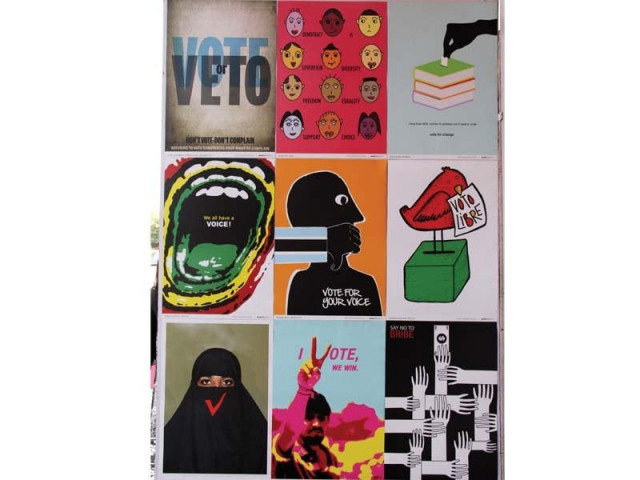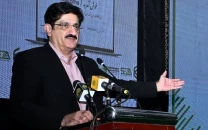‘Skype, ePals will help reinforce academic concepts in students’
Panelists stress the need to integrate new media into the mainstream education.

This giant poster at the Arts Council featured pictures reflecting the importance of casting votes for the progress of democracy.
Integration of new media such as Skype and ePals into the classrooms will help reinforce academic concepts and improve students’ exposure to the outside world, said teacher Asma Sikandar at the Teachers Literature Festival on Thursday.
The festival is a prequel to the Children’s Literature Festival to be held today and tomorrow. Sikandar was of the view that pens and books are not enough to keep pace with the changing world. “Not all children can excel at reading and writing through books only. We need another platform and new media is the platform to reinforce academic concepts.”
Relating her experience of using these methods in her classroom, she said that the students benefitted greatly from speaking to students of other countries via ePals, while she moderated the emails for content and language.
“It’s a collaborative learning experience where students can get exposure, are able to exchange ideas and can project a better image of Pakistan to the world,” explained Sikandar, adding that there are companies that provide free software for educational institutions that would otherwise cost $200 to $300. “The internet is an ocean. You just have to pick the right keywords.”
Sana Saleem and Farieha Aziz of Bolo Bhi, an organisation working on internet freedom, privacy and gender, spoke of ways teachers could involve students in an interactive learning environment by using free websites. This is meant to highlight the fact that money is not a factor in interactive learning. These websites are free of cost and all they require is an internet connection, they stressed.
“Don’t pin your hopes on the government,” spoke Saleem. She urged teachers to be proactive and utilise free audio and visual resources available on the internet.
A panel of teachers from the Aga Khan University also joined the discussion and spoke on two-way communication in education.
Azra Naseem of the Aga Khan University spoke about instilling the culture of lifelong learning among students and encouraging teachers to stop teaching and start learning themselves.
“We have to make the current media more interactive and innovative,” she said. “What we learn in schools may not be useful later on in life, but what is useful is learning how to learn. We have to teach students how to become learners.” She also spoke on the importance of using all characteristics of the new media, mainly the interactive features, to engage students, rather than simply showing them videos and slides.
Published in The Express Tribune, February 21st, 2014.



















COMMENTS
Comments are moderated and generally will be posted if they are on-topic and not abusive.
For more information, please see our Comments FAQ